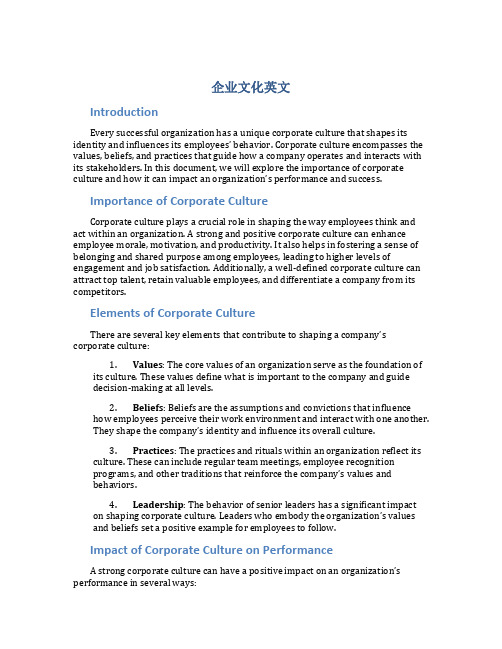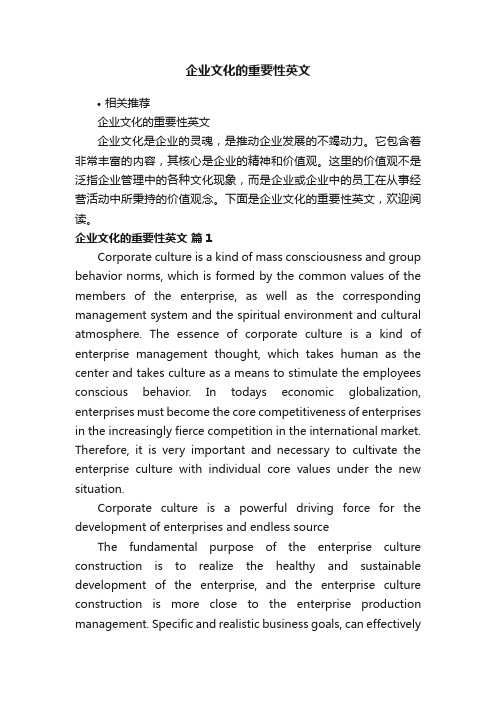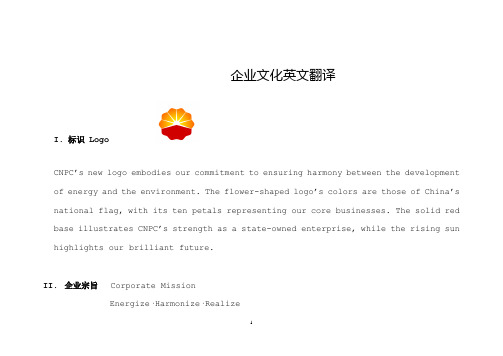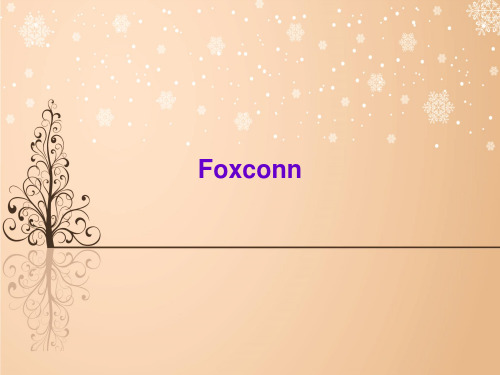企业文化(英文)
企业文化的属性、特征及其功能作用

企业文化的属性、特征及其功能作用企业文化一词源于英文"corporate cultures"一词。
企业文化的内涵具体包括如下一些因素:价值观、行为准则、企业经营管理哲学、经营理念、企业精神等构成企业文化的核心内容。
它是企业为生产经营管理而形成的观念的总和,是一种以人为中心的企业管理理论。
它强调管理中的软要素,其核心是企业价值观。
国内外学者对企业文化的定义有不同的表述。
几乎每个管理学家都对企业文化有一个定义,国外学者对企业文化有以下看法:美国加利福尼亚大学管理学院教授威廉·大内在《Z理论——美国企业界怎样迎接日本的挑战》一书中认为:“传统和气氛构成了一个公司的文化,此外,文化还包含一个公司的价值观。
”美国当代管理学家、斯坦福大学教授托马斯·彼德斯和小罗伯茨·沃特曼在《寻求优势——美国最成功公司的经验》一书中指出,所谓公司文化,包含了几个基本原则,这些原则是算数的,必须严肃对待,它们代表了公司存在的意义。
美国的特雷斯·迪尔和阿伦·肯尼迪在《企业文化》一书中指出,企业文化是由企业环境、价值观念、英雄人物、礼节和仪式、文化网络5个重要因素组成的。
中国学者对企业文化的定义有以下看法:中国社会科学院工业经济研究所研究员韩淑兰认为,企业文化可以有广义和狭义之分。
广义的企业文化是指企业创造的具有自身特色的物质文化和精神文化;从狭义上讲,企业文化是企业以自己的个性形成的经营宗旨、价值观和道德行为准则的总和。
刘光明将企业文化定义为在从事经济活动的组织中形成的组织文化。
其意识形态和物质形态,如价值观、行为准则等,都是组织成员所认同的。
经过多年对企业文化的深入学习和研究,中国企业联合会企业文化研究室认为,从空间上讲,企业文化与一个组织的内外部环境有关。
企业内部文化的形成总是为了使从事经济活动的组织能够更有效地整合内部资源,更好地适应外部市场环境,从而实现企业的经济目标。
企业文化英文

企业文化英文Company culture refers to a set of shared values, beliefs, attitudes, and behaviors that shape the character of an organization. It is a vital element in building a successful and sustainable business. A strong and cohesive culture promotes employee engagement, fosters teamwork, and enhances productivity. In this essay, we will explore the importance of company culture and how to build a successful one.Why is company culture important?1. Attracts and retains top talentA strong company culture can attract high-performing employees who share the same values and beliefs as the company. These employees are more likely to be engaged and committed to their work, leading to lower turnover rates and higher retention rates.2. Creates a positive workplace environmentA positive workplace environment can improve employee morale, reduce stress and increase job satisfaction. A strong company culture promotes employee well-being, which translates into a more satisfying workplace.3. Builds a strong brandA strong company culture can set an organization apart from its competitors. It can become a key differentiator that helps the company attract customers and build a strong brand reputation.4. Increases productivity and profitabilityA positive and supportive company culture can lead to increased productivity and profitability. When employees feel valued and engaged, they are more likely to be motivated and work more efficiently.How to build a successful company culture1. Define your company valuesThe first step in building a successful company culture is to define your company values. Values are guiding principles that define what is important to your organization. They should guide every aspect of your business, from decision-making to how you treat employees and customers.2. Lead by exampleLeaders play a vital role in shaping the company culture. They should lead by example and act in accordance with the company values. Employees will look to their leaders for guidance on how to behave and what is expected of them.3. Create a positive work environmentCreating a positive work environment involves fostering a culture of respect, communication, and transparency. Encourage employees to share their ideas and opinions and provide meaningful feedback. Celebrate successes, and recognize employees for their achievements.4. Promote teamworkPromoting teamwork is essential to building a successful company culture. Encourage collaboration and open communication among employees. Foster a sense of community by organizing team-building activities and social events.5. Hire for cultural fitWhen hiring new employees, it's important to consider cultural fit in addition to their skills and experience. Look for candidates who share your company values and can contribute to the culture you are trying to create.6. Empower employeesEmpowering employees involves giving them the autonomy and resources they need to do their jobs effectively. Encourage creativity and innovation by providing resources such as training and development opportunities.7. Continuously evaluate and evolveFinally, company culture is not something that can be built overnight. It requires continuous evaluation and evolution. Monitor employee engagementand feedback and make changes as needed. Continuously explore ways to improve and strengthen the culture.In conclusion, a strong company culture is essential for building a successful and sustainable business. It attracts and retains top talent, creates a positive workplace environment, builds a strong brand, and increases productivity and profitability. By defining your company values, leading by example, promoting teamwork, hiring for cultural fit, and empowering employees, you can build a successful and cohesive culture that sets your organization up for success.。
企业文化英文

企业文化英文IntroductionEvery successful organization has a unique corporate culture that shapes its identity and influences its employees’ behavior. Corporate culture encompasses the values, beliefs, and practices that guide how a company operates and interacts with its stakeholders. In this document, we will explore the importance of corporate culture and how it can impact an organization’s performance and success.Importance of Corporate CultureCorporate culture plays a crucial role in shaping the way employees think and act within an organization. A strong and positive corporate culture can enhance employee morale, motivation, and productivity. It also helps in fostering a sense of belonging and shared purpose among employees, leading to higher levels of engagement and job satisfaction. Additionally, a well-defined corporate culture can attract top talent, retain valuable employees, and differentiate a company from its competitors.Elements of Corporate CultureThere are several key elements that contribute to shaping a company’s corporate culture:1.Values: The core values of an organization serve as the foundation ofits culture. These values define what is important to the company and guidedecision-making at all levels.2.Beliefs: Beliefs are the assumptions and convictions that influencehow employees perceive their work environment and interact with one another.They shape the company’s identity and influence its overall culture.3.Practices: The practices and rituals within an organization reflect itsculture. These can include regular team meetings, employee recognitionprograms, and other traditions that reinforce the company’s values andbehaviors.4.Leadership: The behavior of senior leaders has a significant impacton shaping corporate culture. Leaders who embody the organizat ion’s values and beliefs set a positive example for employees to follow.Impact of Corporate Culture on PerformanceA strong corporate culture can have a positive impact on an organization’s performance in several ways:1.Employee Engagement: When employees feel connected to theircompany’s culture, they are more likely to be engaged in their work andcommitted to the organization’s success.2.Innovation: A culture that values creativity and risk-taking can fosterinnovation and help a company stay ahead of its competitors.3.Customer Satisfaction: Employees who are aligned with thecompany’s culture are more likely to deliver exceptional customer service,leading to higher levels of customer satisfaction and loyalty.anizational Resilience: A strong corporate culture can helporganizations navigate challenges and adapt to changing circumstances with resilience and agility.Building a Positive Corporate CultureCreating and maintaining a positive corporate culture requires a concerted effort from all levels of the organization. Some key strategies for building a positive corporate culture include:municate Values: Clearly communicate the company’s valuesand expectations to all employees, and ensure that they are integrated intoeveryday practices.2.Lead by Example: Senior leaders should embody the values andbehaviors they want to see in their employees, serving as role models for the rest of the organization.3.Empower Employees: Give employees a sense of autonomy andownership over their work, allowing them to contribute to the company’sculture and success.4.Celebrate Success: Recognize and reward employees who exemplifythe company’s values and make positive contributions to the organization.5.Continuous Improvement: Regularly assess and refine thecompany’s cul ture to ensure that it remains relevant and aligned with theorganization’s goals and objectives.ConclusionIn conclusion, corporate culture is a critical aspect of any organization that can have a significant impact on its performance and success. By investing in building a positive and strong corporate culture, companies can create a more engaging and productive work environment, attract top talent, and differentiate themselves in the marketplace. A well-defined corporate culture is essential for fostering employee morale, promoting innovation, and achieving long-term organizational success.。
企业文化的重要性英文

企业文化的重要性英文•相关推荐企业文化的重要性英文企业文化是企业的灵魂,是推动企业发展的不竭动力。
它包含着非常丰富的内容,其核心是企业的精神和价值观。
这里的价值观不是泛指企业管理中的各种文化现象,而是企业或企业中的员工在从事经营活动中所秉持的价值观念。
下面是企业文化的重要性英文,欢迎阅读。
企业文化的重要性英文篇1Corporate culture is a kind of mass consciousness and group behavior norms, which is formed by the common values of the members of the enterprise, as well as the corresponding management system and the spiritual environment and cultural atmosphere. The essence of corporate culture is a kind of enterprise management thought, which takes human as the center and takes culture as a means to stimulate the employees conscious behavior. In todays economic globalization, enterprises must become the core competitiveness of enterprises in the increasingly fierce competition in the international market. Therefore, it is very important and necessary to cultivate the enterprise culture with individual core values under the new situation.Corporate culture is a powerful driving force for the development of enterprises and endless sourceThe fundamental purpose of the enterprise culture construction is to realize the healthy and sustainable development of the enterprise, and the enterprise culture construction is more close to the enterprise production management. Specific and realistic business goals, can effectivelystimulate the enthusiasm and creativity of employees, so that employees feel that only the value of the enterprise to achieve their own value. This kind of value orientation is the purpose of the enterprise culture construction. The spirit of enterprise business philosophy, advocating the construction of enterprise culture and become the staff once the formation of group consciousness, will be transformed into consciousness, initiative and creativity of staff, formed to promote the development of the enterprise power and endless source.The construction of enterprise culture has distinct characteristics of the timesAt present, because China is in the social transition period, the East and west culture collide with each other, the traditional culture and the new idea are mixed, the idea and the value orientation of the enterprise staff appear the diversification trend. Therefore, the construction of enterprise culture has distinct characteristics of the times. Learning - Digestion - absorption - innovation is the inevitable process of the development of the enterprise culture, the enterprise can not stick to a fixed form of cultural expression, while keeping the essence of enterprise culture change, form and innovation of enterprise culture, increase cultural content, it is necessary to consolidate and develop the enterprise culture construction. The enterprise should not only inherit and carry forward the excellent part of traditional culture, and combined with the current socialist market economy, to learn from other advanced enterprise culture and management mode, to lay a solid foundation for the innovation of enterprise culture. The Xinjiang spirit of "love and love, unity and dedication, hard work and mutual cooperation, pioneering and enterprising" is the national spirit of the Chinesenation with patriotism as its core and the regional embodiment of the spirit of reform and innovation in Xinjiang.People oriented is the important content of enterprise cultureHuman is the main body of enterprise management activities, and the positive and initiative of human being is the guarantee of enterprise management activities. Therefore, the enterprise management should be to mobilize the enthusiasm of the people, to do the work of the people as the fundamental. Therefore, the construction of enterprise culture should be based on the fundamental problem of human being. The construction of enterprise culture only firmly establish the guiding ideology of people-oriented, adhere to the dedication, love the industry, entrepreneurship, entrepreneurship education, carry out education in patriotism, collectivism and socialism, to discover enterprise, enterprise, enterprise Xing my glorious failure I shame the corporate culture to motivate employees, respect and understanding, harmony the atmosphere of caring for people, inspire people in the formation of enterprise, to provide a strong spiritual power and ideological guarantee for the development of enterprises.Excellent corporate culture is the core competitiveness of enterprisesWhat is the core competitiveness of enterprises? Different periods have different understanding. Science and technology are the primary productive forces, "advanced science and technology", "staff quality", "talent", "technical strength" is more and more valued by enterprises. With the continuous progress of human society and civilization, people have found that these elements of the enterprise is not necessarily the development ofadvanced science and technology, will be left behind, the technology will be eliminated, people flow, the advantage of the enterprise can eventually lose. There are many advantages of the objective of an enterprise, but it is difficult to play out, and ultimately can not avoid the fate of being eliminated. Excellent corporate culture overcomes the difficulties and shortcomings of the enterprise, so that enterprises have their own advantages to play a role. Enterprises to meet the challenges of economic globalization, to gain the initiative in the fierce international competition, we must strengthen the basic hardware construction, strengthen the enterprises "software" - the construction of enterprise culture, change old ideas, old model and method, the specific content of the enterprise through the understanding of enterprise near and long-term planning enterprises are facing the situation, and the staff concerned about the hot focus of difficult problems, will guide the staff personal gain and enterprise development together, forming a cooperative situation in unison, to enhance the core competitiveness of enterprises.To sum up, cultivate the enterprise culture core values are the effective ways and means to enhance the core competitiveness of enterprises, enterprise culture construction is excellent development in adapting the changes of historical conditions in, is advancing in the dialectical unity of inheritance and innovation in the traditional, only respect, face reality and innovation, explore the new road. The enterprise can be in an invincible position in the fierce competition in the market.中文:企业文化是以企业成员共有的价值观为核心而形成的一种群众意识和群体行为规范,以及与之相适应的管理体制和物化的精神环境、文化氛围。
中英文企业文化标语

中英文企业文化标语English:"Respect, Integrity, and Excellence are at the core of our company culture. We strive to create a respectful and inclusive work environment where everyone's voice is heard and valued. Our commitment to integrity is unwavering, and we hold ourselves to the highest ethical standards in all of our business dealings. We believe in the pursuit of excellence in everything we do, from our products and services to our relationships with customers and partners. By embracing these values, we aim to foster a culture of teamwork, innovation, and continuous improvement, driving our company forward to achieve greater success."中文翻译:"尊重、诚信和卓越是我们公司文化的核心。
我们努力创造一个尊重和包容的工作环境,每个人的声音都能被听到和重视。
我们对诚信的承诺是坚定不移的,我们在所有的业务往来中都严格要求自己遵守最高的道德标准。
我们相信追求卓越,无论是我们的产品和服务,还是与客户和合作伙伴的关系,我们都追求卓越。
通过秉持这些价值观,我们旨在培育一个团队合作、创新和不断改进的文化,推动我们的公司不断取得更大的成功。
3、企业文化标准译文

企业文化英文翻译I. 标识 LogoCNPC’s new logo embodies our commitment to ensuring harmony between the development of energy and the environment. The flower-shaped logo’s colors are those of China’s national flag, with its ten petals representing our core businesses. The solid red base illustrates CNPC’s strength as a state-owned enterprise, while the rising sun highlights our brilliant future.II. 企业宗旨 Corporate MissionEnergize·Harmonize·RealizeCaring for energy, caring for you(在文章中使用)III. 企业精神Corporate philosophy爱国、创业、求实、奉献Dynamic, loyal, honest, committedIV.经营理念 Operating principle诚信、创新、业绩、和谐、安全Achieving excellence through innovation and integrity.V. 其它1 大庆精神“Daqing spirit”2 铁人精神“iron man spirit”3 三老四严“3 values4 musts”“3 values”: to be honest, sincere andethical;“4 musts”:must be stringent,organized, dedicated and disciplined.4 新时期铁人contemporary iron man5 精神文明建设moral enrichment6 主人翁精神entrepreneurial spirit7 互帮互学、团结协作、团队精神teamwork8 艰苦创业精神pioneering spirit9 以人文本people-first10 资源优化配置effective resource allocation11 公益事业social responsibility。
富士康-企业文化 英文

Thanks for your attention
Suicide
Main article: Foxconn suicides Sun Danyong, a 25-year-old male, committed suicide in July 2009 after reporting the loss of an iPhone 4 prototype in his possession. In reaction to a spate of worker suicides where 14 died in 2010, a report by 20 Chinese universities described Foxconn factories as labour camps and detailed widespread worker abuse and illegal overtime. In response to the suicides, Foxconn installed suicide-prevention netting at some facilities, and it promised to offer substantially higher wages at its Shenzhen production bases. Workers were also forced to sign a legally binding document guaranteeing that they would not kill themselves.
What should be changed?
• The employers should therefore adjust their management style and build a cohesive and energetic corporate culture. • Improving worker's welfare. • Buiding recreation center. • Providing counselling service and education and training.
企业文化英文

企业文化英文Corporate CultureCorporate culture plays a crucial role in shaping the identity and values of a business organization. It refers to the collective beliefs, attitudes, and behaviors that define the way people interact, work, and make decisions within a company. A strong and positive corporate culture can contribute significantly to the success and growth of a business.At our company, we place great importance on building and nurturing a vibrant corporate culture. Our culture is characterized by strong values, a sense of purpose, and a focus on employee well-being and development. We believe that a healthy and inclusive work environment fosters creativity, collaboration, and innovation, which are essential for achieving sustainable growth and maintaining a competitive edge in the market.Core Values:Our corporate culture is built upon a set of core values that guide our actions and decisions. These values include:1. Integrity: We adhere to the highest ethical standards, conducting business with honesty, transparency, and fairness. We believe that integrity is the foundation of trust and long-term relationships with our stakeholders.2. Quality and Excellence: We are committed to delivering high-quality products and services that exceed customer expectations.We strive for excellence in everything we do and continuously improve our processes and performance.3. Teamwork and Collaboration: We foster a cooperative and inclusive work environment, where employees are encouraged to collaborate, share knowledge, and support each other. We believe that diverse perspectives and collective efforts lead to better outcomes.4. Customer Focus: Our customers are at the center of everything we do. We listen to their needs, understand their challenges, and provide tailored solutions to meet their requirements. Building long-term relationships with our customers is our priority.5. Innovation: We embrace creativity, experimentation, and a growth mindset. We encourage our employees to think outside the box, explore new ideas, and find innovative solutions to address business challenges.Sense of Purpose:Our organization is driven by a clear sense of purpose: to make a positive impact on society. We believe that business success goes hand in hand with social responsibility. We are committed to conducting our operations in a sustainable and environmentally friendly manner. We strive to contribute to the communities in which we operate, by creating job opportunities, supporting local initiatives, and giving back through corporate social responsibility programs.Employee Well-being and Development:We recognize that our employees are our most valuable asset. Their well-being, growth, and development are essential to the overall success of our organization. We prioritize their physical and mental well-being, providing a safe and healthy work environment. We promote work-life balance, offer flexible work arrangements, and encourage employees to take breaks and recharge.We also invest in our employees' professional development and career advancement. We provide regular training programs, mentorship opportunities, and performance feedback to help them enhance their skills and reach their full potential. We believe in recognizing and rewarding achievements and fostering a culture of continuous learning and growth.Conclusion:Corporate culture is the bedrock upon which an organization's success is built. At our company, we embrace a strong and positive culture that is rooted in our core values, sense of purpose, and commitment to employee well-being and development. We believe that by nurturing a vibrant corporate culture, we can create a motivated, engaged, and high-performing workforce that drives innovation, delivers exceptional results, and achieves sustainable growth.。
- 1、下载文档前请自行甄别文档内容的完整性,平台不提供额外的编辑、内容补充、找答案等附加服务。
- 2、"仅部分预览"的文档,不可在线预览部分如存在完整性等问题,可反馈申请退款(可完整预览的文档不适用该条件!)。
- 3、如文档侵犯您的权益,请联系客服反馈,我们会尽快为您处理(人工客服工作时间:9:00-18:30)。
•Procedures for roles (job descriptions)
•Procedures for communication
•Procedures for disputes
•Coordinated at top by narrow band of senior
management
•More…
High Behavioral Control
Low Employee Turnover
6
Organizational Culture
Functions
Defining boundaries Conveying identity Promoting commitment Controlling behavior
14
Power Culture
•Based upon trust, empathy and personal conversation •May be abrasive and competitive and result in turnover •Few policies, procedures •Control exercised by selection of key people •Proud, strong, flexible •Lots of faith placed in individuals, little in committees •Trade unions, property, trading and finance companies
15
Role Culture
•Strength in pillars (functions or specialties)
•Work and interaction in pillars controlled by:
•Procedures for roles (job descriptions)
•Procedures for communication
Liabilities
Impeding change Inhibiting diversity Blocking mergers Blocking acquisitions
7
How A Culture Begins
Hiring and Retention
Indoctrination & Socialization
Strength
High
Performance
Low
Satisfaction
Perceived as Organizational Culture
22
•Procedures for disputes
•Coordinated at top by narrow band of senior
management
16
Role Culture
•Strength in pillars (functions or specialties)
•Work and interaction in pillars controlled by:
Behavior and Role Modeling
8
Selection
Sustaining a Culture
Top Management
Socialization
9
How Organizational Cultures Form
Philosophy of the
Organization’s Founders
Organizational Culture
1
What Is Institutionalization?
Permanence
Value
Immortality
Behavior
2
What Is Organizational Culture?
A system of shared meaning held by members that distinguishes the organization from other organizations.
Networked
Communal
Sociability
Low
Fragmented
Mercenary
Low
Cohesiveness
High
12
Institutional Theory
Power
Roles
Task
Person
13
Power Culture
•Central power source •Traditionally small, entrepreneurial organizations •Power rings are centers for activity and influence •Strings are functions and specialties •Usually spawns other organizations •Must concentrate on a few activities to work well •More…
20
Person Culture
•Influence is shared •Power base is expert (if needed) •People do what they are good at •If organization achieves its own identity it becomes a task culture at best – more often Role or Power •Architects, lawyers, doctors, professors
18
Task Culture
•Adaptable culture •TMT mainly responsible for resource allocation to projects teams (not day to day/hands on) •Good for short product life cycle, flexible, changing environments •Custtomer always right – product really important •When resources dwindle, stage ripe for politics •Ad agencies, consultants, defense contractors
17
Task Culture
•Job/project oriented •Bring together appropriate resources (right people at right level) •Influence based more on expert power than position or personal power •Groups/project teams – mutual objective of accomplishing task •More…
19
Person Culture
•Self oriented •People work for themselves and only band together for their own betterment •Psychological contract – organization is subordinate to individual and depends on the individual for existence •More…
Top Management Selection
Socialization
Organizational Culture
10
Stories
Rituals
How Employees Learn Culture
Language
Material Symbols
11
High
Four-Culture Typology
4
Do Organizations Have Uniform Cultures?
Dominant Culture
Subcultures
Core Values
5
Intensity of Core Values
Commitment to Core Values
Strong Versus Weak Cultures
3
What Is Organizational Culture?
• Innovation and risk taking • Attention to detail • Outcome orientation • People orientation • Team orientation • Aggressiveness • Stability
21
How Organizaormance and Satisfaction
Objective Factors • Innovation/risk taking • Attention to detail • Outcome orientation • People orientation • Team orientation • Aggressiveness • Stability
